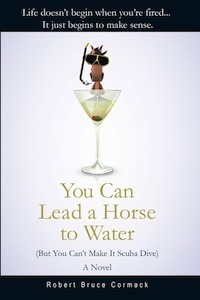Even Michelangelo Got Fired (And Hit With a Stick By a Pope).

We don’t think of great artists being fired, but Michelangelo was dumped numerous times. One client thought his work was so lousy, he wouldn’t pay him. Another time, Michelangelo refused to show Pope Julius II his sketches for the Sistine Chapel. Pope Julius beat him with a stick and fired him (popes carried sticks and swords back then, and weren’t afraid to use them).
Vincent Van Gogh was axed from his uncle’s art business for telling clients they had lousy taste. “You couldn’t have picked worse if you’d tried,” he told a woman. She turned out to be one of the gallery’s best customers. Van Gogh found himself in a Belgium mining town after that, failing miserably as a minister. On the bright side, some of the sketches from that period have since been sold for millions of dollars.
History is full of firings and, where famous artists are concerned, it’s usually on the grounds of what they call “gross insubordination.” It sounds worse than it is. Anna Wintour, editor-in-chief of Vogue, was fired from Harper’s Bazaar after only 9 months. Her gross insubordination was doing innovative shoots that her editor, Tony Mazalla, considered “a little too edgy.”
It doesn’t take much “edgy thinking” to earn yourself the chop these days. More likely, it’s the cause of it. There’s a great line in the movie “Reds” where John Reed’s editor (Gene Hackman) tells Reed (Warren Beatty), “You aren’t a real newspaper man until you’ve been fired.” In other words, if you haven’t “shocked an editor” you really aren’t a true journalist.
Hunter S. Thompson shocked so many editors, he was constantly being fired. On an early assignment, covering The Kentucky Derby, he called his editor to say he couldn’t finish the piece. Hoping to at least salvage something from Hunter’s abused expense account, the editor told him to send in his notes. Thompson typed them up and sent them off. Those free-flowing notes would become “gonzo journalism” and make Thompson famous.
Whenever I hear people say they’ve never been fired, I’m always a little suspicious. Not that everyone has to be fired to be any good. I’m just more comfortable with people who have been. I remember one creative director getting fired for storming into a focus group once and telling everyone they were idiots. That’s not so much gross insubordination as stating the obvious. Focus groups really do have a lot of idiots.
Advertising has always had spectacular firings. I was fired once with thirty other people in one day. Many were creatives — some were really good creatives. Walking down the hall afterwards, I counted the people who weren’t fired. Most of them seemed incapable of “gross insubordination.” The following year, the agency lost two big accounts. Seems firing creative employees over innocuous ones ain’t too bright.
That’s not to say agencies always fire the wrong people. Sometimes it’s justified. But it’s all too common in our industry — especially these days — to get rid of insubordinates. As one account director explained, “You don’t need arguments when the agency’s trying to get things done.”
Really? What do people think agencies did back in the sixties? They had to get things done, too. In fact, they had just as many deadlines, reviews and accounts threatening to find another shop. The only difference between then and now is why they left. Many clients left because of creative differences. Some battles between agencies and clients were legendary.
Today, clients don’t leave because of creative differences. They leave because of results. They simply aren’t seeing any. Once an agency decides they’re a service business, they forget they’re supposed to be selling. Instead of hiring creatives, they’re hiring more innocuous players, those eager little bunnies, always ready to “run out to a meeting” at a moment’s notice.
I remember reading somewhere: “When you’re old, you don’t regret what you did, you regret what you didn’t do.” If you haven’t been fired, there’s every chance you “didn’t do” a lot of things. It’s a safe strategy, one that became a central theme in my last novel “You Can Lead a Horse to Water (But You Can’t Make It Scuba Dive).”
My main character, Sam, worked at the same agency for 30 years. He did what he was told, had the occasional bright idea, and essentially lived under the wing of Frank O’Conner, the owner. It wasn’t until Sam was fired, and having panic attacks, that he realized his biggest fear: Was he even capable of thinking for himself?
Isn’t it funny, though, how amazed we are that Mark Cuban, Steve Jobs — even Colonel Sanders — were fired for thinking differently? Wasn’t it only losers who got fired? And weren’t they supposed to stay losers, not end up with their picture on chicken joints all over the world?
Instead of being amazed, maybe companies should keep their insubordinates and fire the innocuous ones. I mean, shouldn’t we have more — not less — gross insubordination? Isn’t that what agencies need? Lots of attention? Different thinking? I mean, seriously, who ever sees an article like: “35 Innocuous People Who Made Millions”? We’re more likely to see “35 Innocuous People Who Died At Their Desks and Nobody Noticed.”
And, c’mon, it’s not like you can take an innocuous person and make them grossly insubordinate. Japan tried that when their economy tanked back in the early nineties. They needed new, fresh ideas, but nothing happened. Everyone was trained to do what they were told.
For those of you who have no problem with being innocuous (and staying employed), here’s something Steve Jobs said after he was fired from Apple: “The heaviness of being successful was replaced by the lightness of being a beginner again, less sure about everything. It freed me to enter one of the most creative periods of my life.”
Make you think, doesn’t it? Maybe pink slips aren’t so bad afterall.
Robert Cormack is a freelance copywriter, journalist, blogger and novelist. His first novel “You Can Lead a Horse to Water (But You Can’t Make It Scuba Dive)” is available online and at most major bookstores. Check out Yucca Publishing or Skyhorse Publishing for more details. Coming soon (I hope), a collection of short stories called “Would You Mind Not Talking to Me?” I’ll keep you posted.

""
Articles from Robert Cormack
View blog
And why I feel gritty about the future. · “The veterans have brought their own pennants, bicycles, f ...

A year later, he earned 20 times that. · “No decent career was ever founded on a public.” F. Scott F ...

Fuck. · “I thought about reading a poem by Shakespeare, but then I thought, why should I? He never r ...
Related professionals
You may be interested in these jobs
-
Directeur commercial, Foresterie
Found in: Talent CA C2 - 1 day ago
Brandt Mont-Laurier, Canada Full timeExecutive/Senior Management · Mont-Laurier, QC · • ID: · • Full-Time/Regular · Brandt est actuellement à la recherche d'un Directeur des ventes, Foresterie pour le Québec et les régions de l'Atlantique. Le titulaire du poste est responsable d'augmenter la part de marché en ter ...
-
administrative officer
Found in: Talent CA 2 C2 - 3 days ago
Numinous Consultancy Mississauga, CanadaEducation: · Expérience: · Education · Secondary (high) school graduation certificate · or equivalent experience · Tasks · Review and evaluate new administrative procedures · Establish work priorities and ensure procedures are followed and deadlines are met · Carry out adminis ...
-
Bilingual Executive Director, Client Relations
Found in: Talent CA C2 - 6 days ago
Canadian Institute for Health Information Montreal, Canada Permanent Full timeAt CIHI, we recognize what matters to our employees. · Some of the benefits of working at CIHI include HOOPP Pension Plan (Defined Benefits Pension) · Retirement Planning Program · Generous vacation days for permanent and long-term contracts · Work-life balance · Career Planning ...




Comments
Bill Stankiewicz
7 years ago #1